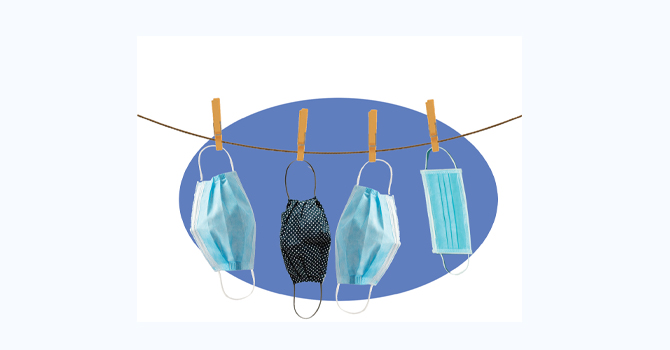Wearing sweat-soaked masks not beneficial: Experts

By A Staff Reporter
Kathmandu, July 2: Summer heat is here and the season of sweat is upon us; sweat that soaks the mask we are wearing. But that is problematic, according to health experts, who stress that masks should not be worn when wet with sweat.
The World Health Organisation (WHO) recommends people to not wear masks at all when engaged in physically strenuous activities like exercising which can cause a lot of sweating because sweat-soaked masks make it difficult to breathe and promote the growth of microorganisms.
This opinion is held by Dr. Sameer Mani Dixit, director of research at the Centre for Molecular Dynamics Nepal, who suggests people carry two masks with them when going about their day. “People should always carry an extra mask so that they can change it if the mask they’re wearing gets wet,” he said. However, experts emphasise that masks should be an additional precautionary measure to and not a replacement for social distancing.
Moreover, WHO, as well as Dr. Dixit, say that surgical masks cannot be reused and must be discarded when damp. “Other reusable masks should also be worn only after a wash in detergent water,” Dixit said.
There is no reason to be as cautious with clothes, though as doctors all over the world generally agree that transmission of the coronavirus through clothing items is unlikely, except for a few scenarios when people are in direct close contact with an infected individual.
As per interviews and reports by Healthline, an American medical website edited by a team of doctors, pharmacists, clinical professors, psychiatrists, nutritionists and healthcare technology experts, humidity and moisture play a significant environmental role in whether or not a virus can thrive and the nature of most clothing items is not conducive to this. But regular laundry is a good idea.
Shoes, though, are a different story. A March study conducted by researchers in China and published by the US Centers for Disease Control and Prevention (CDC) shows that the coronavirus can live on the soles of shoes. They also are in constant contact with the ground so they tend to carry bacteria and other contaminants.
But WHO believes that the likelihood of COVID-19 being spread from shoe soles is very low. This is because we do not often touch them with our hands and they do not come in contact with our noses and mouths. “Nevertheless, cleaning and disinfecting the shoes is advisable,” both WHO and the study state.
Recent News

Do not make expressions casting dout on election: EC
14 Apr, 2022
CM Bhatta says may New Year 2079 BS inspire positive thinking
14 Apr, 2022
Three new cases, 44 recoveries in 24 hours
14 Apr, 2022
689 climbers of 84 teams so far acquire permits for climbing various peaks this spring season
14 Apr, 2022
How the rising cost of living crisis is impacting Nepal
14 Apr, 2022
US military confirms an interstellar meteor collided with Earth
14 Apr, 2022
Valneva Covid vaccine approved for use in UK
14 Apr, 2022
Chair Prachanda highlights need of unity among Maoist, Communist forces
14 Apr, 2022
Ranbir Kapoor and Alia Bhatt: Bollywood toasts star couple on wedding
14 Apr, 2022
President Bhandari confers decorations (Photo Feature)
14 Apr, 2022











